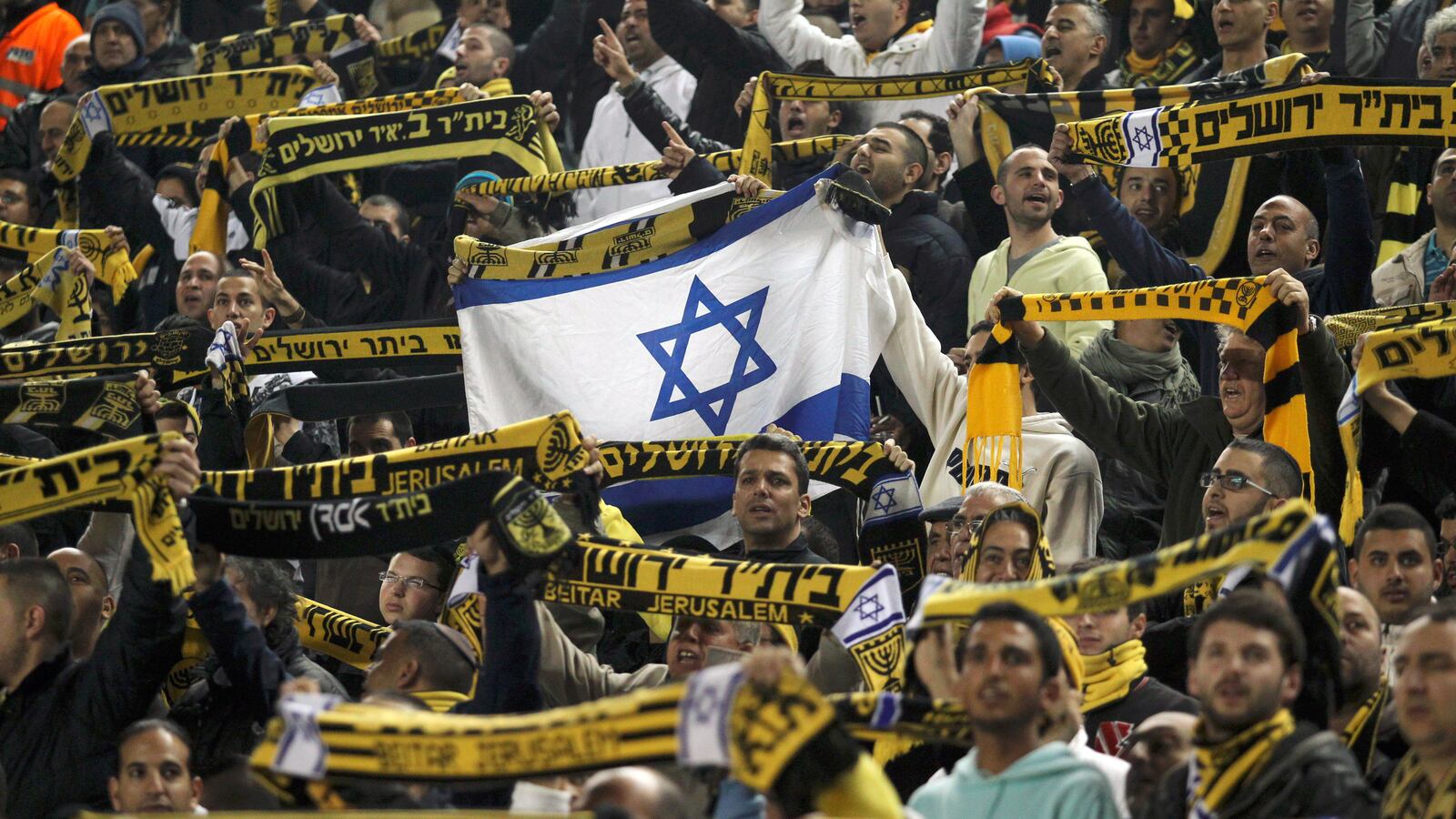This week three more young men in their twenties were arrested in connection with the arson at the offices of the Beitar Jerusalem soccer club. The fire on February 8 marked the height of the drive by the team's extremist racist Jewish fans to get the club's management to oust the two Muslim players it had just signed on. Beitar has always identified with the right-wing nationalist politics of Likud and it had a 70-year tradition not to sign on Muslim players. But the members of La Familia sparked outrage locally and abroad when they held up a Nazi-reminiscent banner insisting that "Beitar is pure forever" at the first home game following the announcement that two Muslim players were arriving in Jerusalem. Now, the police are cracking down on Beitar's extremist racist fans, but only at the game itself would we see who would dominate: La Familia or the sane Beitar fans who just wanted to support their team and see great soccer.

I attended the game Beitar played just two days after the arson. It was no regular game. Fate would have it that of all the teams in the major league, Beitar, the team that had become synonymous with racism against Arabs, was playing against the only Arab team that day. Outside the entrances to the Teddy soccer stadium long lines of young men wearing hoodies and black-and-yellow Beitar scarves waited to be looked over and then frisked by guards. Those wearing La Familia logos were kept out. The rest were thoroughly patted down, as I was to experience first-hand—a sign of the fears and the tension that awaited us inside.
Indeed, the atmosphere in the stands was electrifying. The combination of thousands of wasp-colored Beitar fans and hundreds of grim Border Police officers holding semi-automatic machine guns and stiff private security guards in black jackets felt flammable. The Beitar fans knew if they voiced any racist chants against Arabs or Muslims, they would be kicked out. Dozens were. Across the stadium in the northeast corner, the mass of red-colored fans of Bnei Sakhnin was like a flag at a bullfight. And the eastern stand, historically the home of La Familia, was empty. Instead of fans, a printed banner hung in the bleachers declaring, "The eastern stand also opposes racism." The stand was closed as part of the crackdown on La Familia, who are believed to number over 5000.
As I entered the western stand of the stadium, minutes before the game began, I saw a few Beitar people hang a banner over an exit saying, "Your hatred is burning our love." And I watched a young bearded fan arguing heatedly with a few others, saying, "What matters is the game, not the religion of the people playing it."
But I also saw a lot of suspicion. Walking around with pen and paper in hand was probably a mistake—I received dark looks from fans. Some fans yelled at me as I passed (without cursing) that the media was the reason for their problems—which was true, in a way. One man who noticed me standing behind him while he cursed the Arab team (without racist references) turned around and said defensively, "I’m allowed to curse."
Indeed, the atmosphere begged it. And as I said to him, "Hey, curse all you want. With this energy, I'll be cursing soon, too."
The roar from the relatively small number of Bnei Sakhnin fans filled the stadium when their team scored the first goal in the first half hour, drawing angry looks and quietly muttered curses from Beitar fans. But it was the shouts of joy from Arab MK Ahmed Tibi, who sat in the closed-in VIP section at the top of the western stand, which got them jumping angrily to their feet.
Tomer, a middle-aged man wearing a hoodie and jeans, told me he was worried about Beitar. "I think they should let the Muslim play this game. Maybe it will help. I've been to every single game since I was seven years old. But these young fanatics have hurt our team. If they keep this up, I'll stop coming."
Beitar Jerusalem is the soccer club of Israel's right-wing. It was named after the world Zionist youth movement founded by Ze'ev Jabotinsky that aimed at educating its members with a military and nationalistic spirit. (Later, Jabotinsky established the political and military arms to his movement. The latter, known as the Etzel, was responsible for blowing up the King David Hotel and for committing the Deir Yassin Massacre and was considered a terrorist organization even by the Jewish Agency.)
But the fans were never so extreme as they have become in recent years. Maybe it was the reality they lived in. While the team is almost 70 years old, the hardcore violent fans formed a group that they named La Familia in 2005, around the end of the Second Intifada. In 2007, the group first used the symbol of the terrorist Kach group (a fist in a Jewish star) when fans waved an enormous Kach flag during a game against Bnei Sakhnin. Some La Familia members put the Kach symbol on their Beitar badges.
Sometimes fans would riot at the adjacent shopping mall after home games. One incident in March 2012 made headlines after part of it was caught on film. Beitar fans harassed and spat at two Arab women and their children eating in the food court. Then, yelling “Death to Arabs,” they beat up the Arab sanitation workers who came to their aid.
In 2011, Yedioth Ahronoth tabloid and Walla news website ran a story on how the Beitar fan club teaches kids to shout “Death to the Arabs.”
The night before Israel’s elections last month, the two most extreme MKs, Michael Ben-Ari (a former Kach member) and Aryeh Eldad, attended a Beitar game, allegedly to gain support. (Fortunately, their party, Otzma L'Yisrael (Power to Israel), did not pass the threshold.)
But that night at the game, fans mostly refrained from racist curses against the other team. With 11 minutes till the end of the game and the score 2:1 in favor of Bnei Sakhnin, Dzhabrail Kadiyev, the 19-year-old Chechen Muslim defender made his debut. Kadiyev's entry was the only moment when fans from both sides were united. The fans in red clapped for the Muslim player in Beitar uniform, probably as loudly as the portion of Beitar fans that supported him. "We all did," a young guy from the Arab Jerusalem neighborhood of Beit Safafa told me later. "We were a ton of people from Beit Safafa at the game to support Bnei Sakhnin, but we applauded for the Chechen."
Then there were the La Familia fans who booed not only when Kadiyev got on the field, but every time his foot touched the ball. Nevertheless, Kadiyev played well and with five minutes to go Beitar scored another point, ending the game in a tie. Everyone went home and no fights took place. (But the Arab fans had to wait one hour before they were released from the stadium, the guy from Beit Safafa told me.)
Yariv Ben-Hamo, 23, a big guy with a crew cut who is a longtime Beitar fan, told me that he also clapped in support of the Muslim player. "I'm against all this," he said in reference to La Familia's actions. "My dad, for example, really opposes this. He even stopped going to games and even being interested in the scores because of all this." Ben-Hamo said La Familia was "a bunch of 15- and 16-year-olds who they instilled in their brains this thing about 70 years without an Arab (player). The more extremist you are politically, you have to be in La Familia." Some of his friends are members. When I asked him how the hardcore group began, he asked me: "Ever heard of prejudices?"
No one knows why Beitar owner Arkady Gaydamak suddenly brought two Muslim players to the group. The management insists it approved the acquisitions on the basis of the players' skills. But in an interview in Maariv, the President of Chechnya said Gaydamak had asked for the players and he gave them to him out of goodwill. Gaydamak, who supports a Palestinian state and has long wanted to bring an Arab onto the team, may have hoped that this would spark the change he wanted to make in the team and its fans.
Leaders of La Familia claim the group will stop attending games, which they say will leave the bleachers much emptier.
It is doubtful that the arrests of a few more La Familia members will cause the racist group to disband. But the regular presence on the field of those two young Muslims dressed in the wasp-like black and yellow striped uniforms with the emblem of a menorah over their hearts, combined with the support of the “sane” Beitar fans, will make La Familia irrelevant. That is, if the two players don't break first. La Familia members have been giving the young players a hard time. Team members told Maariv that they feel sorry for what the two have to endure. Sports and Culture Minister Limor Livnat assured Kadiyev's mother, who came for Sunday's game, that her son was safe. In the meantime, the two sleep in a hotel with a guard at their door.






